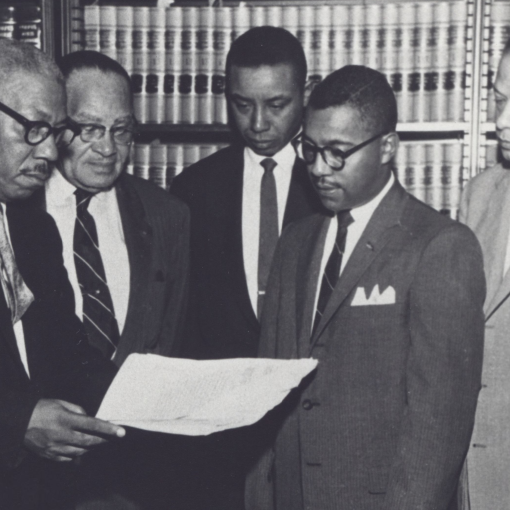Durham: A Heritage of Faith, Down Through the Years
Durham would not be what it is today if not for the influence of its Black churches and religious leaders.
This story is a part of our African American Heritage Guide Project, a printed guide and collection of stories about Durham's Black history, culture, community and entrepreneurship created by Black writers, poets and artists. Find more stories and information about the guide.
In the African American community, the church has long been seen as a place of standards, security and status with an expectation of excellence. The Black church has been positioned to be the place for healing, for reckoning, the place to which the ones in need can go for support, a shelter to those in their travels and transitions, and the place that is expected to raise a voice heralding social justice and righteous change.
Activism in the Church
As a part of the Jim Crow South, African-American churches in Durham have a history steeped in social justice and activism. The Royal Ice Cream Sit-in of 1957 was provoked by the segregated seating and service in the ice cream parlor. Led by Reverend Douglas Moore, pastor of Asbury Temple United Methodist Church, six young, well-dressed African-American students entered the Royal Ice Cream Parlor through the colored entrance in the back, then proceeded to sit in the ‘white only’ section. They ordered ice cream, and, when asked to leave by the owner, they responded by ordering more ice cream. The protesters were arrested and fined.
In his pursuit of justice against the systems of segregation, Moore found himself in the company of influential businessmen like Floyd McKissick, a prominent attorney who represented the participants in the Royal Ice Cream Sit-in, and Reverend James M. Lawson, a fellow Methodist Minister. Reverend Moore also brought petitions to the City Council to end segregation at the Carolina Theater and the Durham Public Library. While some saw Reverend Moore’s activism as controversial, he remained active in the Civil Rights Movement. He became a board member of Dr. Martin Luther King Jr.’s Southern Christian Leadership Conference and was later instrumental in Dr.King’s visit to White Rock Baptist Church in 1960. Dr. King’s visit marked a pivotal moment in Durham’s civil rights activism.
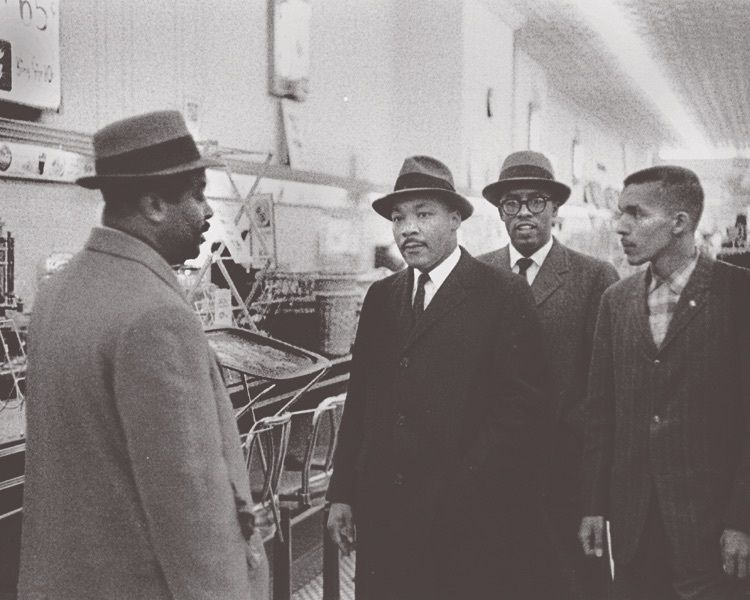
Methodist Reverend Douglas Moore led the Royal Ice Cream Sit-in and worked with Rev. Dr. Martin Luther King, Jr. Photo: Durham County Library Historical Photo Collection
Women in the Church
Women’s role in ministry has been influential in the church’s leadership in the Black community. African American women have been charged with the task of nurturing children, families and communities as a whole. Proudly embracing the wisdom, legacy and genius of women in ministry (and academia), Durham has been the home of influential leaders like Reverend Dr. Pauli Murray and Reverend Dr. Emilie Townes, both of whom have lived as examples of faith in action. There is no shortage of women in pulpit ministry, community activism and other forms of ministry/service in Durham.
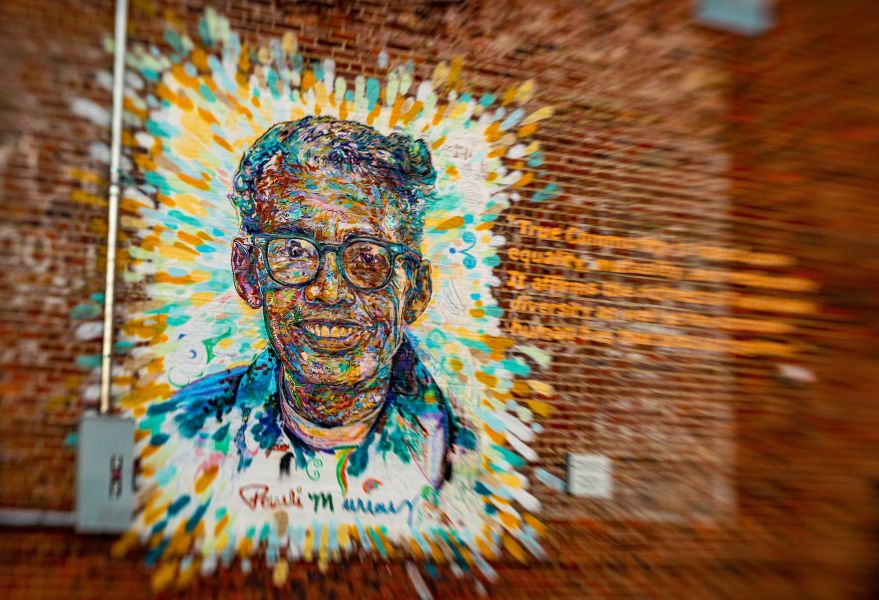
Reverend Dr. Pauli Murray's presence was influential in religious spaces and beyond. Photo: Discover Durham
There are churches in Durham that, through every transition, have been standing as a strong, consistent and true support to the African American community. Rabbi Abraham Joshua Heschel gave the charge to ‘pray with your feet’, implying that the work of prayer is not passive. It includes actions designed to change. There are churches in Durham that have, historically, prayed with their feet and found ways to grow, stretch and change along with Durham’s community.
St. Joseph AME Church
W.E.B. Dubois is known to have said he had never seen a church as great as St. Joseph African Methodist Episcopal Church. Established in 1869, the same year the City of Durham was incorporated, the original structure is now the Hayti Heritage Center in the historic Hayti District. In 1976, the building was dedicated as the Hayti Heritage Center, and the church congregation made a new home at 2521 Fayetteville St. The Hayti Heritage Center and what became St. Joseph AME Church have been a staple and a beacon of hope and stability in the Durham community.
Reverend Dr. Jonathan C. Augustine was appointed the 31st Senior Pastor of St. Joseph AME in 2019. Under his leadership, the church has continued to be a cornerstone of the Durham community. St. Joseph has worked to foster a relationship with North Carolina Central University (NCCU) and its chancellor, implementing NCCU Sunday (#NCCUSunday), which is an initiative designed to raise scholarship funds for NCCU students.
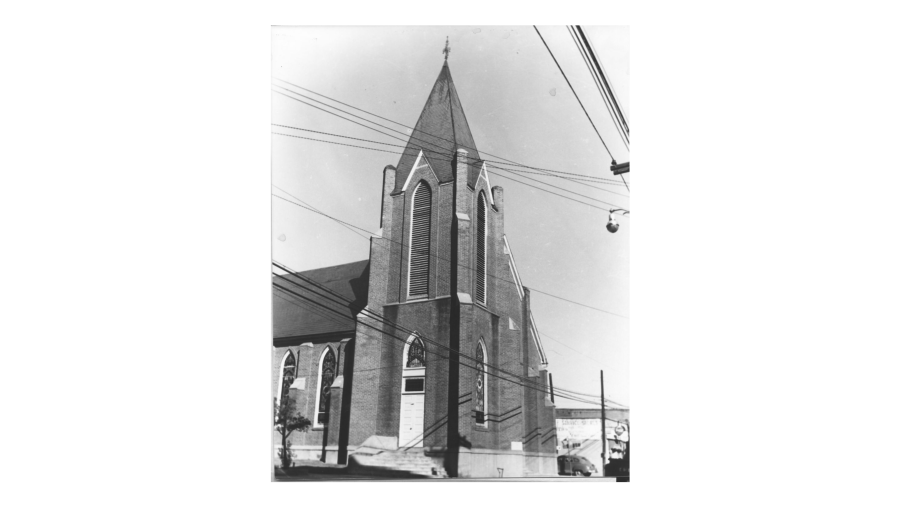
Today, St. Joseph's houses the Hayti Heritage Center. Photo: Durham County Library Historical Photo Collection
African American heritage and social justice are parts of the fiber of the ministry of St. Joseph; you will find kente cloth, some bearing Adinkra symbols, adorning the pulpit. ‘Souls to the Polls’ is the church family’s commitment to activating people to vote during local, state and national election cycles. Social Justice Sundays have honored historic Durham moments like the Royal Seven Ice Cream sit-in of 1957 and notable figures in Durham’s African-American history and present. Pastor Augustine and First Lady Michelle, work side by side in the continuation of 150 years of excellence at St. Joseph African Methodist Episcopal Church.
Holy Cross Catholic Church
Holy Cross is significant as one of the first African American Catholic churches in North Carolina and one of only a handful in the Southeast. Since its first mass in December of 1939, Holy Cross Catholic Church has served the Black community in Durham through fellowship and initiatives like The Coalition for a Beloved Community, made popular by Dr. Martin Luther King Jr. and guided by community service, solidarity and advocacy. Within the Beloved Community concept at Holy Cross, the Justice Education Initiative uses book parties to educate the Durham community about homelessness and poverty.
Holy Cross Church participates in the African Ancestry Ministry and Evangelization Network, which is structured to create an atmosphere that affords those of African descent room to maintain their identity while fully engaging the practice of the Catholic Church.
The church’s original sanctuary was completed at 1400 S. Alston Ave. in 1953. When the congregation made the decision to move to its current location at 2438 S. Alston Ave. in 2006, the property was sold to NCCU. In its Centennial year, 2010, the university moved the structure from its original location to where it currently stands on the corner of Pekoe Avenue and Fayetteville Street. The sanctuary was then renamed Centennial Chapel and now stands on the campus of NCCU. In its 85th year of ministry in Durham, Holy Cross Catholic Church continues to actively invest in being an accessible, progressive and nurturing space to the African American community.
White Rock Baptist Church
Organized in 1866 and officially founded in 1875, the congregation was led for many years by Dr. Augustus Shepard, father of NCCU founder Dr. James E. Shepard. The original parishioners of White Rock Baptist Church had a commitment to living free lives and to securing the freedom of the African American community in Durham. On February 16, 1960, Dr. Martin Luther King, Jr. gave the speech “A Creative Protest” in the church. That speech, aligned with White Rock’s historic social justice presence since its inception in 1866, sent young people forth to fearlessly persevere in the pursuit of justice in Durham.
With a congregation that has hailed many community professionals, doctors, lawyers and elected officials, White Rock Baptist Church has historically been willing to use its time, talent and treasure in uplifting the African American community in Durham and beyond. White Rock was founded by everyday people who came out of social and economic struggle to band together in their faith to believe that it’s in their power to create something better. The congregation moved to its current building in 1977 after the original site was demolished to build the Durham freeway.
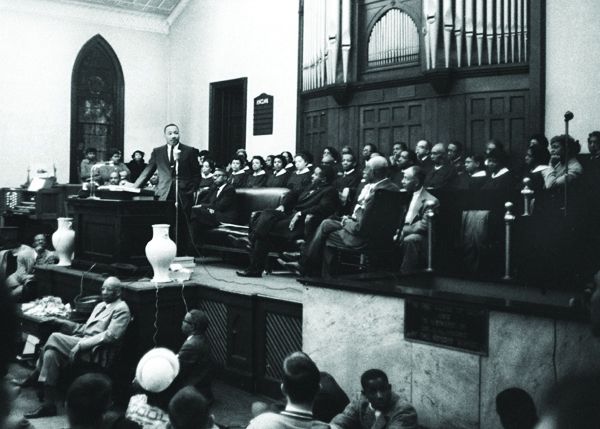
Dr. King delivered his "A Creative Protest" speech at White Rock Baptist Church. Photo: Durham County Library Historical Photo Collection
For 155 years this congregation has stood in agreement with the power of faith in God and the joining together of like minds and spirits to manifest something greater than where they started and to inspire a belief that there is more to come.
Durham, NC has always been a vibrant city with a diversity of people, a thriving African American community and a number of faith communities that have taken pride in shaping this place and this history. The faith of the church extends beyond walls and denominations through the people who make Durham a community and a home.
more stories from the African American Heritage Guide
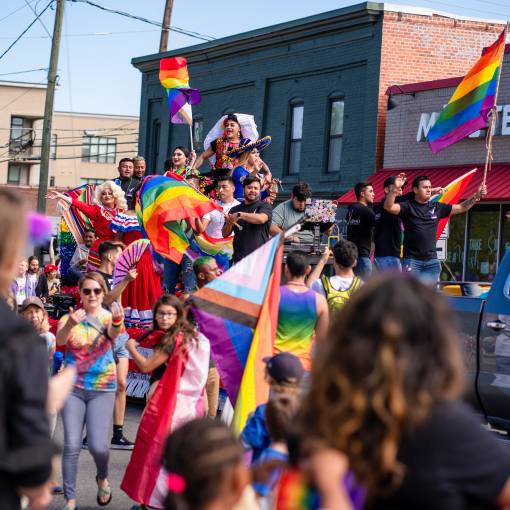
Advocacy & Activism in the LGBTQIA Community There is no separation between African American heritage and LGBTQ advocacy in Durham. Learn More

Hayti Heritage Center, Then and Now “It has been my honor to serve as guiding steward of the Hayti Heritage Center, a cultural treasure rooted in the Hayti community. The Foundation has provided quality arts programming for nearly 50 years while preserving the incredible heritage of a historic venue that dates back to 1891. The city is enriched by the Hayti Heritage Center, [one of] the last remaining original structure[s] from Durham’s iconic Black Wall Street district.” - Angela Lee, Executive & Artistic Director of Hayti Heritage Center Learn More
